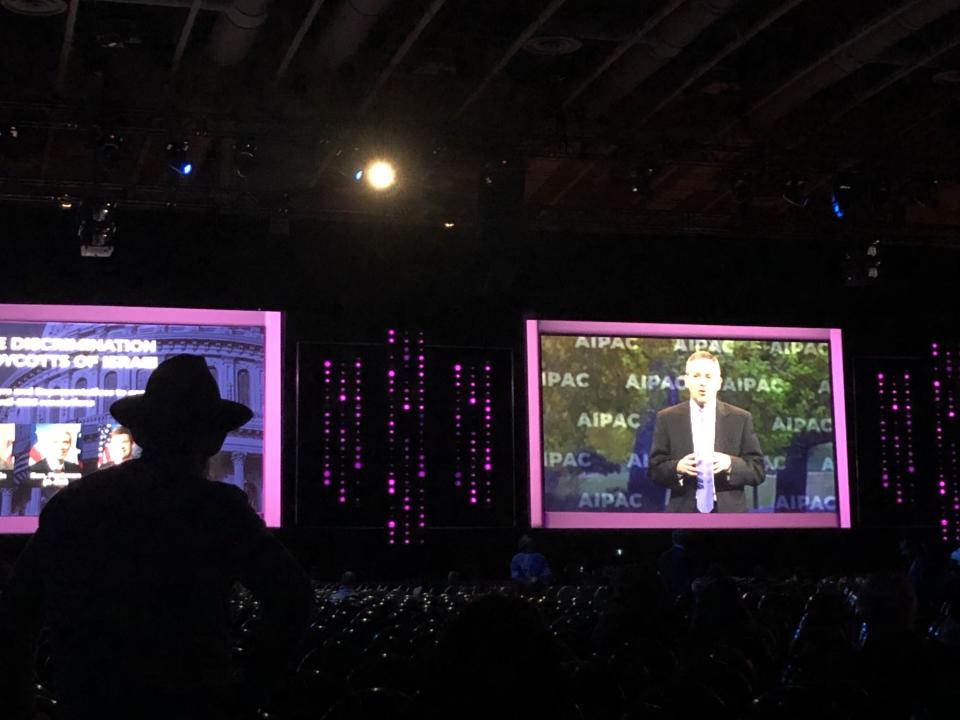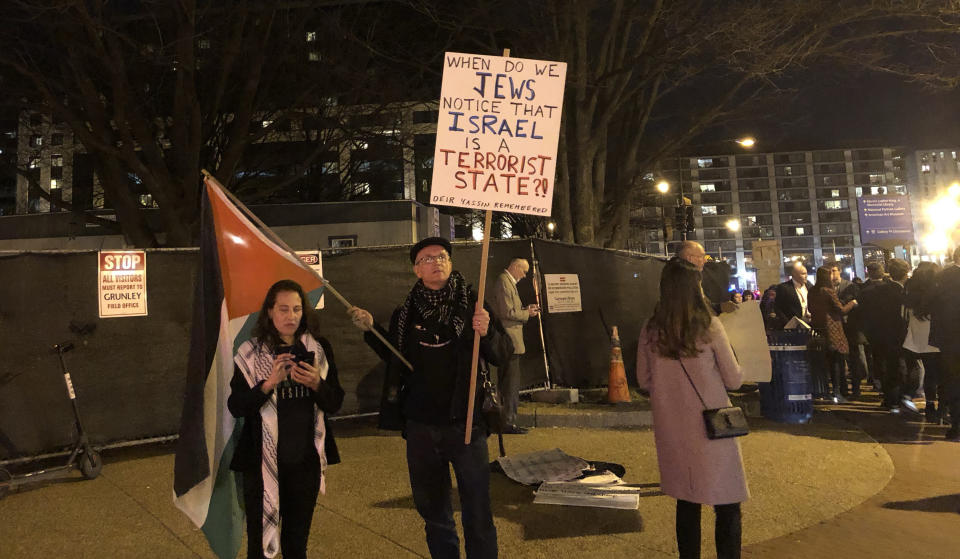Socialism seen as biggest threat to Israel at AIPAC

WASHINGTON — The first evening of the annual conference of the American Israel Public Affairs Committee, or AIPAC, was punctuated by a rousing address from House Majority Leader Steny Hoyer, D-Md., who like several other speakers sharply criticized the progressive wing of the Democratic Party.
“There are 62 new Democratic freshmen in the House,” Hoyer said at one point during his Sunday-evening speech. “Not three.”
The crowd, which was said to be 18,000 people in size, cheered for what was an unmistakable reference to new House members Alexandria Ocasio-Cortez of New York, Rashida Tlaib of Michigan and, in particular, Ilhan Omar of Minnesota. All three have been, to varying degrees, charged with hostility to Israel, with Omar accused of outright anti-Semitism.
Hoyer seemed to indicate that while Israel’s traditional enemies, such as Syria and Iran, remain as determined as ever, it is the rising antipathy toward Israel expressed through the boycott, divestment and sanctions (BDS) movement that is the bigger threat. BDS, which seeks to curb Israel’s economic might, has found support on college campuses, as well as from celebrities such as Pink Floyd co-founder Roger Waters.
AIPAC, which will feature speakers including Vice President Mike Pence, has skewed increasingly right in recent years, and most major Democratic nominees for president decided to stay away this year. In perhaps another sign of this rightward drift, this year’s meeting identified a new enemy: socialism. Or, rather, the progressivism that is increasingly popular in the Democratic Party.
That progressivism has embraced BDS, having come to view Israel as an oppressive power and the Palestinians as a nonwhite minority whose experience is not dissimilar from that of American people of color. In a show of protest on Sunday evening, anti-Israel protesters projected messages onto the facade of the Walter E. Washington Convention Center, where the AIPAC convention was held. “Stop Killing Palestinian Children,” one message said, an apparent reference to Israeli military incursions into the West Bank and the Gaza Strip. “Stop U.S. Aid for Israel’s Crimes,” said another.

Inside the cavernous convention hall, the mood was just as pugnacious. Vowing to “defeat BDS,” Hoyer declared the movement “anti-American,” though he did not explain why this was so. Hoyer’s message matched the theme of this year’s AIPAC conference — which is “Together for Good.” The implication was clear: Insult Israel and you insult the United States.
“I stand with Israel, proudly and unapologetically,” said Hoyer — who is not Jewish— with audible emotion in his voice. “So, when someone accuses American supporters of Israel of dual loyalty, I say: Accuse me.”
Later, attendees said Hoyer’s message resonated. Allan Kaplan, an investor from San Francisco, said that socialism was being used as “another way to promote an anti-Semitic approach to politics. It doesn’t really have anything to do with socialism. It’s just an old canard in a new skin.”
Yehudit Barsky, who works for the Institute for the Study of Global Antisemitism in New York City, pointed out that Israel has a rich history of socialism, perhaps best reflected in the farm collectives known as kibbutzism. She hoped that “more education” would wean the new House members off their suspicion of the Jewish State.
Despite AIPAC’s rightward shift, there were still Democrats in the audience, including Miami University of Ohio student Daveed Abrams. He was hopeful and forgiving. “I think that besides the anti-Semitic comments Ilhan Omar made, she has a lot of potential. I think that she’s willing to fight for people’s rights,” he said, adding that it was “acceptable” to criticize Israel, though not to do so in plainly anti-Semitic fashion.
None of the evening’s main speakers mentioned Omar or her House peers by name. They didn’t have to, given the immense attention she has attracted. Allusion, if not subtlety, sufficed. “Americans don’t support Israel because AIPAC is influential,” said Meghan McCain, a conservative commentator who is the daughter of the late Sen. John McCain, R-Ariz. “AIPAC is influential because Americans support Israel.” She also made reference to Israel’s detractors in “the halls of Congress,” as former Sen. Joseph Lieberman, D-Conn. — the first Jewish American on a major party presidential ticket and a close friend of McCain’s father — stood next to her.

Ron Dermer, the former Israeli ambassador to the United States, went so far as to suggest that Israel might enact a boycott of its own by refusing to trade with certain countries. He asked the audience to imagine a world without mobile phones or certain medications, a reference to Israel’s vaunted digital technology and biomedical sectors.
This may seem far-fetched, but “things can change quickly,” noted Joan Ryan, a member of Parliament in the United Kingdom. Ryan was one of several members of Parliament to recently quit the Labour Party, which is broadly the equivalent of the Democratic Party in the United States, over frustration with Labour leader Jeremy Corbyn, who has stood accused of both harboring personal anti-Semitic beliefs and permitting such beliefs to fester within Labour.
“I’m proud to be a Zionist,” said Ryan, who is also not Jewish. She told her fellow supporters of Israel that it was imperative to "stay on our guard" and "stand our ground."
Outside the convention center, protester Rich Siegel, who had come from New Jersey, was standing his ground too, as hundreds of AIPAC attendees streamed past him. Siegel stood amid them, holding a Palestinian flag and a sign that said, “When do we Jews notice that Israel is a terrorist state?” Siegel said that he had been “completely indoctrinated into the cult of Zionism” as a youth, going so far as to live and work in Israel, only to become disillusioned in his middle years. He accused Israel of ethnic cleansing and said he felt a “moral obligation” to protest AIPAC. Siegel added that he was glad that, given the unambiguously critical message on his placard, nobody had physically attacked him.
“They’ll just walk by,” he said, “and call me a schmuck.”

_____
Read more from Yahoo News:



